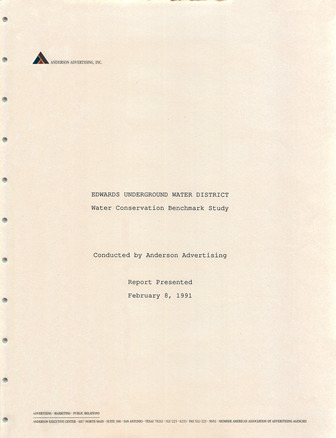Edwards Underground Water District Water Conservation Benchmark Study

| Author | Anderson Advertising |
| Year | 1991 |
| Description | Study to measure consumers' awareness and actions for water conservation. Note: This report is included for its historical value and may have been replaced by more recent studies. |
| Publisher | Edwards Aquifer Authority |
| Location | Edwards Underground Water District Jurisdiction |
| Cover | View Download |
| File | View Download |
| Summary |
|
The Edwards Underground Water District requested a benchmark survey of consumers in the five county area to ascertain the level of awareness and implementation of household water conservation techniques. Specific objectives included the investigation of: * extent of knowledge about the source of water supply in the five-county region, * attitudes toward and knowledge of water usage, * perceptions of the current source meeting the water needs of this region, * current water conservation techniques employed at the household level, * perceptions about the effectiveness of various measures and media to encourage water conservation, and * recall of conservation messages disseminated by the Edwards Underground Water District and other groups In addition to the primary questions, respondents were asked about their opinions about legislative action and taxes or fines as they might impact compliance with water conservation…. Overall the awareness of the Edwards Aquifer and the perceived need for water conservation are very high. However, based on the comparison of current situation and future needs, this sample clearly believes limits may need to be set now, and may become more necessary in the future, in order to have enough water to meet future water needs. Local governmental involvement is the preferred level in terms of limiting such usage. More study needs to be undertaken regarding the setting of standards for water usage by businesses who depend upon water for their livelihood, as a majority of the sample feel that this group’s needs should be addressed separately. This sample is strongly in favor of requirements to install water conservation devices in new homes and tax credits for installation of water conservation devices. The public relations and advertising campaign had its desired impact in raising the level of awareness of specific water conservation techniques based on the playback by respondents of the types of actions they are currently taking to conserve water. However, many respondents believe that public awareness should be raised throughout the year, not only during the summertime, times of high usage, or times of crisis. Regarding the effectiveness of media and measures, teaching children to carry forward the message of water conservation was perceived to be the most effective measure followed by television advertising. Perhaps next year’s campaign should include a greater emphasis on this influential target. Also it is recommended that the EUWD consider a paid television advertising schedule in subsequent campaigns to ensure the greatest reach and frequency of the conservation message. Penalties for wasting water were also perceived to be effective motivators, followed by free installation of water saving devices and rewards for lower usage. Education and advertising were mentioned most frequently as other means to spread the message of the need for water conservation and change behavior. This sample believes that the individual can make a difference, and the Edwards Underground Water District should take full advantage of this belief by continuing its message to individuals as well as taking on the larger, more complex water users identified by the respondents: business and industry. The Edwards Underground Water District should continue its efforts to distribute literature, water conservation kits, and analyze the attitudes and behaviors of the residents in this five-county region. Future research should continue to measure individuals’ conservation efforts to determine if a greater percentage .. of the population is adopting water conservation measures and if those who are already conserving are finding more ways in which to contribute to conservation efforts. Future research should also be directed at the four counties with more rural population to determine if their attitudes are significantly different that the more urban Bexar County. Without other organizational units competing for share of voice, the EUWD message could be more impactful in these regions. |
Search for Documents
Advance Search
Explore EAA's Scientific Reports
- All Reports
- Water Resources Planning and Management
- Floods and Drought
- Water Quality
- Climatology
- Surface Water / Groundwater Relationship
- Biology
- Springs, Groundwater Discharge
- Archaeology
- RZ Protection
- Aquifer Levels
- Remote Sensing
- Precipitation
- Overview Studies
- Modeling
- Hydrology and Hydrogeology
- History
- Groundwater Recharge, Recharge Zone
- Groundwater Movement
- Geomorphology and Caves
- Weather Modification
- Geology
- Water Use and Conservation
- Geochemistry
